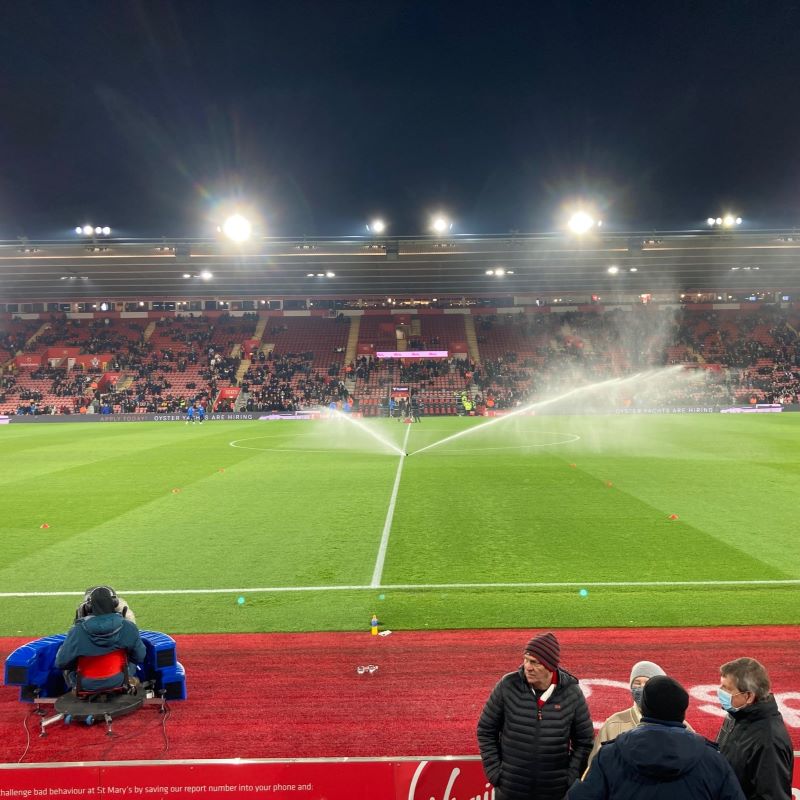by Nick Mabey.
When I wrote my first ‘life at the bottom” article, on 4th January, I didn’t know it would be a series. Saints had just sunk to the bottom of the league and I’d hoped it would be temporary. Six weeks on we’re still there, and there’s a reasonable chance we could be rooted to the same spot for the rest of the season. So I’ve decided to make this series a trilogy, meaning, for those numerically challenged, this will be the last episode.
Some of my favourite film series are trilogies; I’m thinking Godfather, Matrix, Toy Story (before they later ruined perfection with a fourth) and Bourne (the original three before they too cashed in for commercial rather than creative reasons). There is generally a rollercoaster flow through the series, and some sort of redemptive denouement during the final act. In the case of Southampton football club it’s been a pretty grim rollercoaster, more like a fairground ghost train, and I’ve decided to use the sacking of our manager, Nathan Jones, as a fitting climax. It’s not exactly an uplifting finale, hopefully that comes later in the season, but it does mark the end of a very curious episode in our history.
The appointment of Jones as Saints’ manager, on 10th November, allowed him precisely four days of active service before the season paused for the unique oddity that was the FIFA World Cup in Qatar. While we fans switched to national allegiances, and players disappeared to the sweat and sand of the Middle East, Nathan got to work moulding the Southampton squad into the high-performing outfit we had been crying out for. We only had two players away on international duty and so he got the luxury of five weeks unencumbered preparation without the distraction of actual games and all the media shenanigans that goes with them.
The problems began almost immediately the season re-started. To put it bluntly, Southampton looked terrible in those early games. Devoid of shape, fluidity, flair or fortitude, and without any clear identity, any hope of a ‘new manager bounce’ was dispelled pretty rapidly. Nathan Jones was already a controversial appointment, given his lack of experience at Premier League level and a general sense of…’who?’ when he was announced. All of which meant a very turbulent Christmas and New Year period. Act one of my trilogy was written when nearly all hope was lost (click here to read the original Life at the Bottom).
Then there was a strange week, which film critics would call a plot twist. Only this twist was so large it was more like a tornado. In the space of seven days we beat Palace away in the FA Cup, knocked a minor team called Man City out of the league cup, and won away at fellow strugglers Everton in the league. Act two (Life at the Bottom, Part 2) was uplifting and, if not full of sunshine, at least offered some blue skies.
Football, like many things in life, has the habit of kicking you in the teeth, just as you start breaking out into a smile. The defeats just kept coming, and so did the excuses. Jones post-match interviews started attracting the attention of normally-disinterested pundits and it wasn’t long before a toxic atmosphere became the norm, not just on-line but crucially during matches. Lesson to future managers – it’s best not to blame fans, when they are already doubting you and the team’s performances and results are poor. It was only a matter of time before Nathan was given the customary vote of confidence (7th February), followed by the boot (12th February). The final scenes of this three-part tragedy reached levels of farce at home to Wolves. Having played well, taking a lead (shock horror) and seen former Saints pantomime villain Lemina sent off, our team managed to be out thought and out fought against 10-men fellow relegation strugglers Wolves, who we managed to make look like world beaters. When Saints get a player sent off early in games we tend to lose 9-0, when our opponents do likewise we still lose, if only by the margin of 2-1.
History won’t look kindly on Jones’ fourteen game tenure. Statistically his win ratio is better than most of our managers, but three of his five victories were narrow ones against lower league opponents, which goes to show that numbers alone rarely tell the full tale. No one generally gets sacked after only fourteen games unless things are pretty bad and Saints aren’t a club with a reputation for being over hasty in these situations. Jones’ reign was a throwback to the dark days of the early 2000s, bringing to mind such legendary club managers as Stuart Gray, Paul Sturrock and Steve Wigley, all of whom, like Nathan, failed to make it to 20 games.
So where from here? We’re still bottom but not cut adrift with plenty of games left, and we are now looking for a new saviour. Like a seasoned Hollywood director, I’ve ensured my “life at the bottom” trilogy ends with some loose ends left dangling just in case there’s demand for an unnecessary but oh-so-profitable fourth instalment.
- We hope you enjoy our website – please could you help keep it running? In Common is not for profit and we rely on donations from readers to keep it running. Could you help to support us for as little as 25p a week? Please help us to carry on offering independent grass roots media. Visit: https://www.patreon.com/incommonsoton

